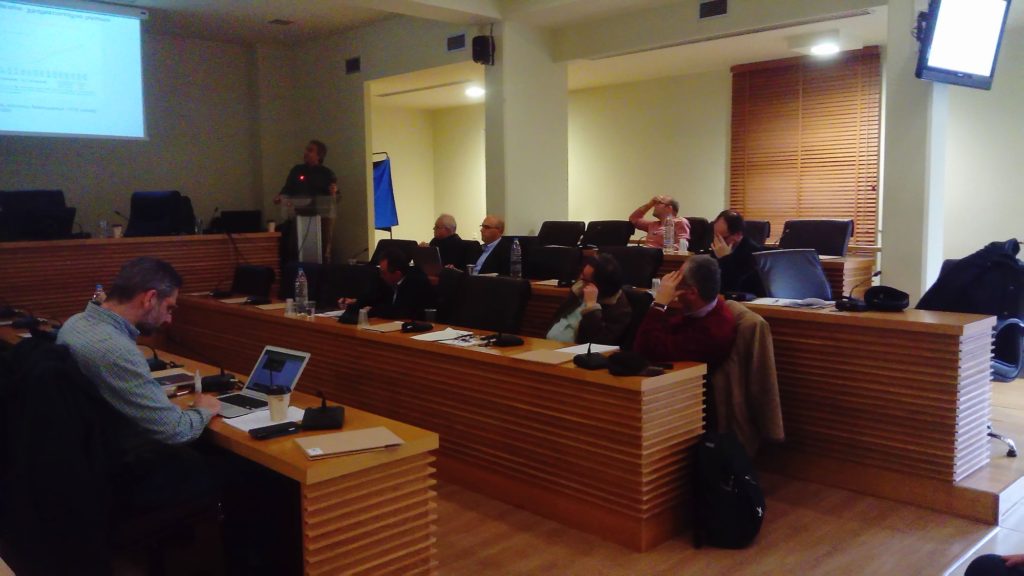Nikos Mantzaris (WWF Greece)
Text and photos by Michalis Prodromou
It’s been only a few weeks since the WWF Greece team reached out to several stakeholders in the lignite sector in Western Macedonia, Greece to discuss the future of the region.
As part of the EUKI-funded program “Just Transition in South-Eastern Europe”, which consists of a partnership of WWF national offices* aiming at setting innovative and socially just plans for the restructuring of coal economies, WWF Greece organised a roundtable discussion in Kozani in order to find common ground between parties with seemingly very different, sometimes conflicting, priorities.
How can one bridge these differences? Is it necessary to do so? How can an environmental NGO sit at the same table with climate skeptics? All these thoughts swirled around our heads, as we drove through the exhausted mines, where once lay rich agricultural land and clean water rivers.
About 30% of Greece’s electricity needs are met from lignite (it used to be double less than a decade ago), and much of it comes from the region of Western Macedonia, in the north-west of the country. The region has already been negatively affected by open-pit mining, but some are still keen to dig out the 1,4 billion tonnes of lignite estimated to be left in the ground of W. Macedonia and even build two new coal plants there. Many others, however, are fully aware that the time for burning lignite has passed and alternatives for the future need to be prepared, starting today.
Bringing together this heterogeneous group of people was as challenging as it was enlightening. The Mayors of Kozani, Ptolemaida and Amyntaio, the President of the Technical Chamber, the Head of the Public Power Corporation’s Workers Union, the Rector of the University of W. Macedonia, representatives from the Regional Development Agency, the Greek Centre for Research and Technology, the Regional Innovation Council, the Kozani Ecological Movement, the Economic Chamber, the Region of W. Macedonia, the local District Heating companies, sat around the same table, expressed their worries and concerns (mostly) and their ideas (to a lesser extent) for bringing about the much-needed change.
One element was common throughout the discussion: the acknowledgment that the ‘party is over’ and urgent action is needed. W. Macedonia is not alone here – more than 40 EU regions face similar dilemmas. Coming from a small region, that cannot influence international energy policy developments, people in W. Macedonia expect a lot from European and national institutions. Shouldn’t the Greek government explain to the local population that lignite is no longer competitive? Shouldn’t the EU pledge far more capital for the local economies that have powered entire countries for over five decades?
On the other hand, the responsibility for coming up with a sustainable and just transition plan and moving forward with concrete actions in the right direction lies with the local stakeholders. Which brings us to the burning question. What is the right direction? Should W. Macedonia build on its competitive advantages, for instance, its promising local agricultural production, its industrial heritage and energy expertise? Or should it make the most out of its lignite reserves, even if that is for non-electricity uses?

Roundtable discussion participants attending WWF Greece’s Mantzaris presentation
Clearly enough, the road ahead won’t be a straight line. It takes time to accept what is already well understood – maybe only at a conceptual level. Expanding lignite activity will only open up more holes in the ground, merely postponing the inevitable and without leaving any added value to the local community. Above all, it sends the wrong message to the local community and Greek and EU
Participants also agreed on the essential conditions for the transformation. Publishing and finalizing Greece’s long-term energy plan, finding alternatives to the district heating system of the area, re-distributing the land back to those who can exploit it in a sensible way and deciding upon the structure of a managing company of this huge project.
In any case, deep transformation will first require turning the ‘lost battle’ feelings into a spirit of hope. It will certainly be a long road ahead but the breakthrough was made as people with different views have started listening to each other and are trying to find the common ground.
Similar seminars will take place in Bulgaria and Poland in the near future as part of this exciting new project, hoping to develop a broader network of people who will contribute towards tackling the huge challenges of just transition at the European level.
* 3 program partners represent coal and lignite plagued areas with no foreseen plans for e socially just transition (WWF Greece, WWF Bulgaria, WWF Poland), led by WWF Germany, which brings on board the experience gained through several years.
Headline photo shows excavators gobbling up the land in front of the briquette-producing unit of
Source: www.just-transition.info


